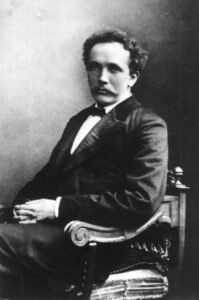 Spotlight – Listen – See in Concert – Review
Spotlight – Listen – See in Concert – Review
Semyon Bychkov sees Strauss as a man who lived in two very different worlds. ‘He was born into one and died in another. He witnessed several collapses of Europe, the last of which the destruction of Germany was what he took with him to his grave. Having established himself as a leader of the avant-garde while in his twenties, and then, while still a young man (from Der Rosenkavalier onwards), he frequently found himself accused of being a renegade. Suddenly Stravinsky, Schoenberg and the new music arrived, and he was no longer considered to be an inventor of new music.
What I find extraordinary is that in Elektra he had already gone to the extreme bounds of tonality. It’s as if he found himself on the edge of a precipice, looked down and saw it was a long way to fall, so instead of taking the next step straight ahead he went sideways. Many of those who followed him didn’t turn and jumped! But time is the best judge of everything. Strauss has survived better than most of his contemporaries.
On Elektra, if one really studies the score, one will discover that the soft dynamics – piano, pianissimo, and even softer than that – actually outnumber by far the loud ones. Most of it is very intimate; it’s chamber music rather than the bombast sometimes ascribed to this opera. That makes the characters appear in a totally different light. Somebody like Clytemnestra suddenly becomes vulnerable and thus capable of provoking our sympathy.’ Strauss once said that his music should be conducted like Mendelssohn – hardly an encouragement to bombast – though Bychkov points out that much of his advice to conductors was tongue in cheek. ‘I’m afraid that his instruction that conductors should never sweat is regrettably not something I can follow!
But conserving energy was vital for him. Look at his diaries in the years he conducted at the Berlin Staatsoper, the first decade of the 20th century. He would have an opera rehearsal in the morning, in the afternoon the rehearsal of a Bruckner symphony that nobody knew in those days, then in the evening he would conduct Tristan und Isolde. At the same time he would write a minimum of ten business letters a day. And also compose, every day. How this man was able to pack all of that into a single day is difficult to comprehend.
He had to organise his energy, otherwise he simply would not have survived. You can see this in the films of him conducting. His extreme reserve sometimes looks like coldness, but there must have been a great deal of shyness about the man. When it came to expressing his own music, blatant sentimentality was absolutely alien to him.’
Listen to Semyon Bychkov conduct the WDR Sinfonieorchester Köln in performances of Strauss Ein Heldenleben and Metamorphosen
See Semyon Bychkov Conduct Strauss in 2013/14:
WEILL HALL, SONOMA STATE UNIVERSITY, SAN FRANCISCO – 21ST NOVEMBER 2013
MOZART: Piano Concerto No. 24
STRAUSS: Eine Alpensinfonie
Till Fellner, piano
San Francisco Symphony Orchestra
DAVIES SYMPHONY HALL, SAN FRANCISCO – 23RD NOVEMBER 2013
MOZART: Piano Concerto No. 24
STRAUSS: Eine Alpensinfonie
Till Fellner, piano
San Francisco Symphony Orchestra
DAVIES SYMPHONY HALL, SAN FRANCISCO – 24TH NOVEMBER 2013
MOZART: Piano Concerto No. 24
STRAUSS: Eine Alpensinfonie
Till Fellner, piano
San Francisco Symphony Orchestra
ROYAL OPERA HOUSE, LONDON – 14TH, 17TH, 20TH, 23RD, 26TH, 29TH MARCH AND 2ND APRIL 2014
STRAUSS: Die Frau ohne Schatten
The Emperor, Johan Botha
The Empress, Emily Magee
The Nurse, Michaela Schuster
Barak, Johan Reuter
Barak’s Wife, Elena Pankratova
Spirit Messenger, Ashley Holland
Orchestra of the Royal Opera House, Covent Garden
“For his farewell Bychkov took the orchestra on a last climb up the Alps, relishing the view from the summit in glowing colours and playing the closing epilogue with an expansive, valedictory eloquence… This was the conductor/orchestra relationship heard at its peak. ”
[BBC Proms – Strauss Ein Alpensinfonie – WDR Sinfonieorchester Köln]
Financial Times, July 2010
“The Alpine Symphony was a superb example not only of the orchestra’s unshowy technical excellence, but also of Bychkov’s combination of restraint, refinement and discrimination. It’s easy enough to make Strauss’s last tone poem sprawl and seem garish, but there was a sense of proportion and moments of ravishing tonal beauty here.”
[BBC Proms – Strauss Ein Alpensinfonie – WDR Sinfonieorchester Köln]
The Guardian, July 2010
“After his recent Daphne with Renee Fleming (Decca), Semyon Bychkov rounds up some of the cast from the 2003 Elektra he conducted at Covent Garden for a Richard Strauss performance as electrifying as they come. Deborah Polaski takes the title role, but the real star of the Royal Opera show, Anne Schwanewilms, is here as her sister, Chrysothemis. Strauss’s angst-ridden portrayal is of a royal family dysfunctional even by Windsor standards. The expertise of this Strauss specialist is evident in every sumptuous bar.”
[WDR Sinfonieorchester Köln – Strauss Elektra – Profil, Edition Günter Hänssler]
The Observer, January 2006